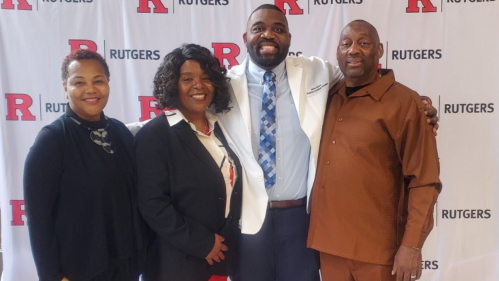For Student Pursuing Physician Assistant Degree, Setbacks and Then Success

Initially struggling to earn a master’s degree, James Moore buckled down and persevered
After dropping out of a physician assistant program in North Carolina following three grueling semesters, James Moore, then 28, found himself working third shift at a warehouse.
He had long dreamed of a career in medicine, but the coursework had proven more difficult than expected.
Moore thought the door to that future had closed.
“I remember the sadness on my mother’s face,” he said. “And then my father told me, ‘It’s OK to hit rock bottom. You just can’t stay there.’”
So, he started again.
This program is definitely hard, but I buckled down and focused. I didn’t get a whole lot of sleep – just a whole lot of praying and a whole lot of studying. I kept persevering.
James Moore
Moore enrolled in a master degree program in physiology – a subject that had once been his greatest academic challenge. He didn’t just get through it – Moore graduated with a 3.8 GPA.
When he applied to physician assistant schools again, he felt ready.
Nine years after leaving his first physician assistant program, Moore walked across the stage on May 20 as a member of Rutgers School of Health Professions’ class of 2025, receiving his master of science degree in physician assistant .
“This program is definitely hard, but I buckled down and focused,” he said. “I didn’t get a whole lot of sleep – just a whole lot of praying and a whole lot of studying. I kept persevering.”
Moore, now 37, had graduated in 2010 from a North Carolina university with a degree in biology, but his grades weren’t strong enough for medical school. After watching friends move on to careers while he worked odd jobs, he returned to community college to retake science courses, then completed upper-level university classes before starting physician assistant school in 2016.
Worried his academic record from his first attempt would hurt his chances, he pursued the physiology degree and became a certified nursing assistant.
Even so, he was surprised when Rutgers – now ranked No. 3 in physician assistant programs nationwide by U.S. News and World Report – offered him a spot in its program beginning in fall 2022.
“I was speechless,” Moore said. “I thought, ‘How did someone like me get accepted?’ I figured there were plenty of stronger applicants.”
His journey reflects the very purpose of our holistic admissions process: to identify individuals with the drive, compassion and strength to make a lasting impact in the lives of their patients.
Matthew McQuillan
Chair, Department of Physician Assistant Studies and Practice
But the admissions team saw something more. “We read your story and got to know you,” one member told him. “You’re a testament to what can happen when people keep working, even when things don’t go their way.”
Matthew McQuillan, chair of the Department of Physician Assistant Studies and Practice, said Moore impressed everyone in the program with his grit and determination to succeed.
“His journey reflects the very purpose of our holistic admissions process: to identify individuals with the drive, compassion and strength to make a lasting impact in the lives of their patients,” McQuillan said. “His story makes us especially proud to count him among our inspiring graduates.
His parents were at convocation – his mother in tears again, this time with pride. Moore’s next goal: pass the certifying exam and find a job in primary care back home in North Carolina.
All through school, he repeated one message to himself: “Don’t go back without that degree.”
And he didn’t.


